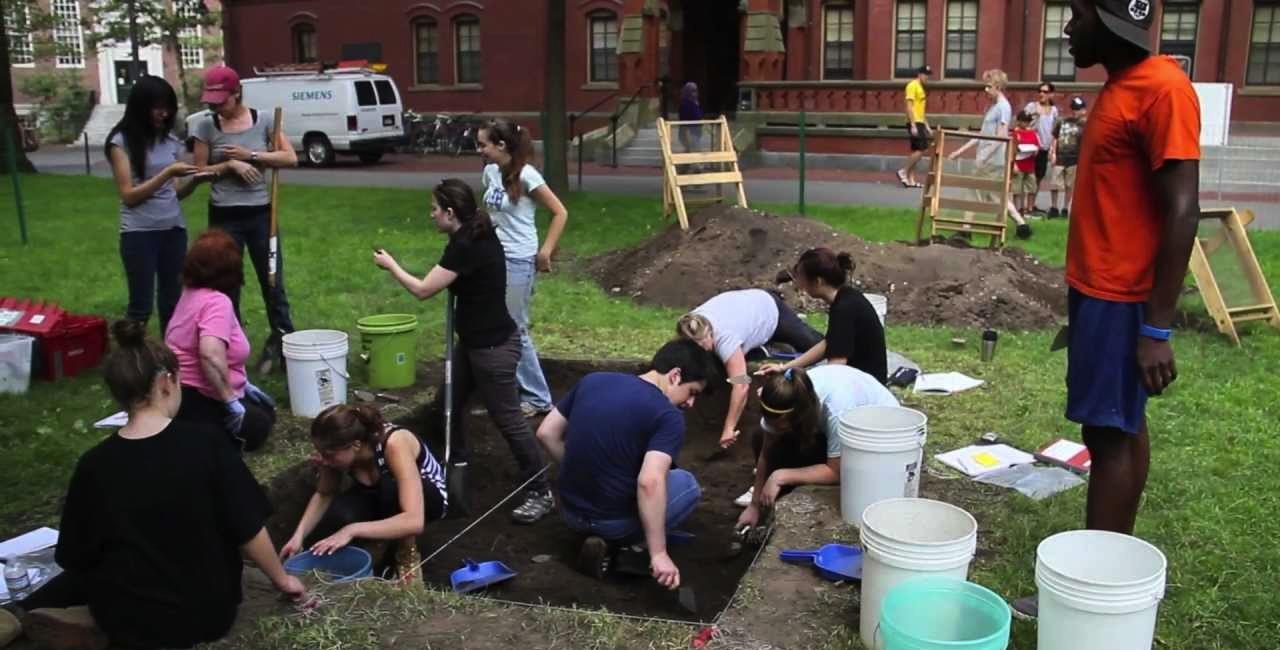
Overview
Archaeology – the study of the human past – is a vibrant field of study at Harvard, with faculty, programs and facilities located in the Social Sciences, Humanities, and the Natural Sciences. Students may draw upon a multitude of disciplines to further their interest in studying and understanding the human past either at the level of a major, within any one of several disciplines, or to pursue work at the level of a Secondary Field in Archaeology. This website will help students identify the many resources and programs offering course work and research opportunities in the archaeology of ancient societies around the world.
What is Archaeology?
Archaeology explains when, how, and why things happened in the past. Archaeologists document patterns of change and variability through time and space, and relate these changes to the world around us today. In broader terms, archaeological research involves the discovery, description, and analysis of technological adaptation, social organization, artistic production, ideology, and other forms of human expression through the study of material remains recovered from the excavation of sites that were used or settled by past peoples. Analyses may be peculiarly archaeological in nature—the classification of broken pieces of pottery is an example—or they may involve the use of methods, analytical techniques, and information from fields as diverse as art history, astronomy, biological anthropology, botany, chemistry, genetics, history, linguistics, materials science, philology, physics, social anthropology, and zoology.
The formal study of archaeology prepares students to evaluate critically the record of human material production and to develop informed perspectives on the ways the past is presented, interpreted, and dealt with by a wide range of actors—from interested individuals to nationstates—in societies around the world today. Archaeologists carry out basic research in the field and in museum collections, and they increasingly deal with such topics as cultural resource management (including the recovery, documentation, conservation, and restoration of ancient artifacts); cultural tourism; nationalistic uses and abuses of the past; the depiction of the past in the media (including film, television, and the internet); the illegal trade in antiquities; repatriation of cultural patrimony; and environmental and climatic change.
Advising and Expectations
For more information, please contact the Secondary Field Adviser in Archaeology, Prof. Rowan Flad at rflad@fas.harvard.edu or anthrouc@fas.harvard.edu. Students interested in or intending to pursue a secondary field in Archaeology should first review their programs of study with the Standing Committee on Archaeology Coordinator by emailing sca@fas.harvard.edu before the beginning of their next-to-last semester. Whether considering or having decided on a Secondary Field in Archaeology, students are strongly encouraged to use the Secondary Fields online tool (courses.my.harvard.edu/) to work out a proposed Plan of Study and to notify the secondary field adviser early on in the process.
Requirements (5 credits)
1. One introductory half-course selected from:
a. GENED 1105: Can We Know Our Past?
b. ANTHRO 1010: The Fundamentals of Archaeological Methods & Reasoning.
c. ANTHRO 1130: Archaeology of Harvard Yard.
d. Introductory course in the archaeology of ancient Greece and/or Rome or in medieval archaeology, as available.
e. In addition to the required introductory course, a student may count only one additional introductory course from the above list for the secondary field.
2. Four additional courses selected from those listed under the course search "Archaeology" in courses.my.harvard.edu and approved by the secondary field adviser.
Other information
Up to three approved courses in General Education may be counted toward fulfillment of the requirements for the secondary field. In addition, one approved course in the student’s concentration and a maximum of two ancient language courses may be counted toward secondary field credit. All course work must be taken for a letter grade and must be passed with a grade of B- or better.
Students pursuing a secondary field in Archaeology are strongly encouraged to participate in an archaeological field school in the U.S. or abroad. Students who complete a Harvardsponsored or a preapproved off-campus archaeological field school may count one course credit from that field school experience toward completion of the secondary field.
Field Schools
Students pursuing a secondary field in Archaeology are strongly encouraged to participate in an archaeological field school in the U.S. or abroad. There are currently two summer archaeological field schools in Latin America taught by Harvard faculty, as well as one field course in the Archaeology of Harvard Yard given every other academic year. Students who complete a Harvard-sponsored or a pre-approved off-campus archaeological field school may count one half-course credit from that field school experience toward completion of the secondary field. Students enrolling in a Harvard or Harvard-approved off-campus study program may seek pre-approval from the Chair of the Standing Committee on Archaeology to have one class on that study program counted. Click here for a complete list of field schools which may be used together with the google map showing research done by Harvard archaeology faculty and graduate students. Travel and funding resources are available here.
Courses
The listing below is a compilation of courses in which the practice of archaeology is taught or the use of archaeological information is integral. The interested student is urged to consult the full listings of the various departments for related courses, relevant undergraduate tutorials, and graduate-level reading courses. The courses listed below are ordinarily acceptable for the Secondary Field in Archaeology with the approval of the Secondary Field Adviser. Additional courses including courses in other departments may also be deemed acceptable. See the Consentration Handbook for more information.